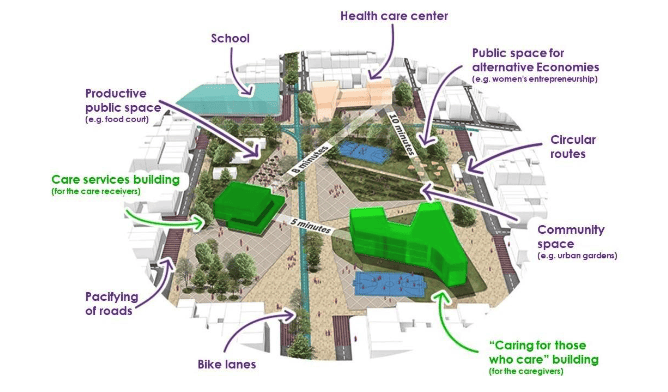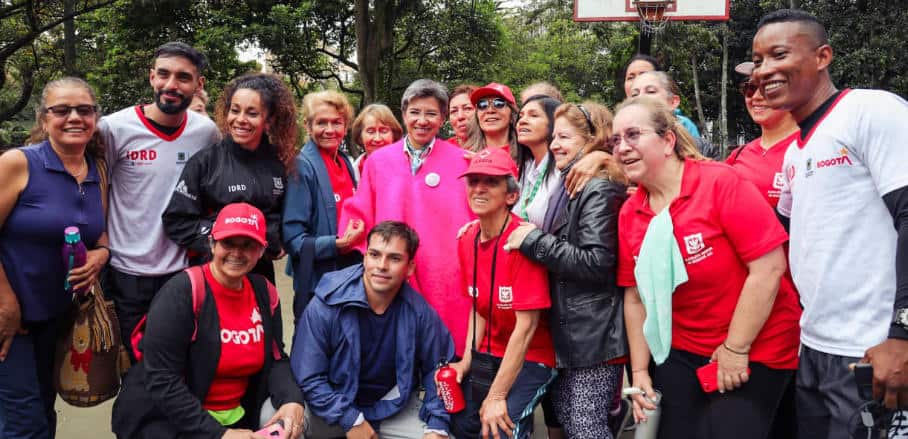Bogota: Centring Women’s Care Work as a Core Municipal Function
In Bogota, Care Blocks are transforming the lives of unpaid caregivers, providing essential services and empowerment. Prabha Khosla explores the empowering impact of these initiatives and the path towards gender-inclusive cities.
Isabella Ruiz Garcia, a 39-year-old mother and full-time caregiver residing in Bogota, Colombia, a sprawling city of eleven million people, sheds light on the reality faced by many women. She explains, “As a woman, we start looking after people almost from the time we are born. When you are at home, you take care of your mother; if you have little brothers, you have to look after them; when you get older you have to look after your own children and grandchildren. That is why I think that for most of our lives, we are care workers. I have never had time to do things for myself.”
The experience of unpaid care work by women is not unique to Bogota but is prevalent worldwide. Women in cities across the globe provide invaluable unpaid care services such as shopping for food and other basics, cooking, cleaning, washing clothes, looking after children, older adults and caring for family members with disabilities or those who are sick. Additionally, they also sustain family and community relations. This is the foundational work that cities are built on.
Bogota’s Commitment to Recognise and Support Unpaid Care Work
According to a recent study conducted by Bogota’s Secretariat of Women, out of the 3.6 million women who are unpaid caregivers, 1.2 million are full-time care workers. Among these full-time care workers: 90 per cent belong to low-income households, 70 per cent have not been able to pursue education beyond secondary school, 33 per cent have no free time for self-care, 21 per cent live with chronic illnesses and 0 per cent enjoy economic autonomy.

Care Blocks are providing support to caregivers, so they can take courses and graduate © Women’s Secretariat, City of Bogota.
Despite this reality, few municipal services were available to support these women until October 2019, when Bogota elected its first woman and open lesbian-feminist mayor – Claudia López Hernández. According to Diana Rodríguez Franco, the Secretary for Women, the commitment to focus on care work as part of Mayor Claudia Lopez’s mandate originates in her pre-election commitments. “There is a very strong women’s movement in Latin America, Colombia and Bogota for governments to address and support women’s invisible and unpaid care work”, she says. “During the election campaign, mobilisation by local feminist organisations, civil society groups and academics led to Claudia López signing a pact with the women’s movement of Bogota to ensure gender-responsive public policies that address the many problems that women face in their daily lives.”
In Colombia, following their election, mayors are legally required to present a 4-year Government Plan to Council for approval. Mayor López included the concept of a care system in her Plan, which was subsequently adopted by the Council.
Bogota’s Collaborative Efforts are Transforming the Lives of Caregivers
In 2020, at the beginning of the pandemic, Mayor López and Rodríguez Franco jointly developed a comprehensive blueprint for the care system for Bogota. The responsibility of implementing this ambitious plan fell to Rodríguez Franco. The implementation strategy was developed in partnership with various stakeholders including the care workers themselves, care specialists and other municipal departments. Additionally, an Intersectoral Commission of the District Care System was created, consisting of 13 entities from the District, the National Government, universities, and civil society organisations. Together, they worked towards improving the lives of the caregivers of Bogota.

Health care centers offer a variety of free sport classes ©Women’s Secretariat, City of Bogota
According to Rodríguez Franco, “the biggest challenge to creating a District [city-level] Care System was to get other municipal secretariats to understand that the implementation of this new initiative was the responsibility of all the structures of the municipality and not only the Secretariat of Women or Health. City secretariats, here as elsewhere, were used to working in silos.” Rodríguez Franco asserts, “To persuade them that they all need to work together was not only the biggest challenge but also the biggest innovation of this initiative with 10 secretariats working together innovatively and successfully.” Another major challenge was in the collection of data. Previously, each secretariat had its own way of collecting data. However, through effective coordination between secretariats a consolidated and holistic approach to city data collection and utilisation was achieved.
One Block at a Time: Bogota’s Care Services Bridge the Gap for Caregivers
At the heart of Bogota’s care system lies the concept of “Care Blocks”. These Care Blocks are strategically located in areas of the city with existing municipal services such as a health centre, childcare centre, school, recreation and community centres and parks within a walking distance of 20 – 30 minutes and do not require the use of transport.

Health care centers in Bogota offer a space for women to participate in different social, recreational and educational activites – all in one place. © City of Bogota
Recognising that women often cannot leave their loved ones alone to participate in educational and recreational services for themselves, the care services are brought directly to the women. There are three components to the care services: firstly, providing services to the caregivers themselves within municipal infrastructure and services; secondly, providing home care assistance to those that cannot reach municipal services; and thirdly, ensuring that the care services cater to the needs of women, men, and their families.
The services encompass a range of free offerings for women including community laundry facilities, physical activities such as exercise, dance and yoga, health services, psychosocial support, legal aid, high school courses so they can graduate, courses in computers, small business enterprises, cultural activities, and the opportunity to socialise together. While women are engaged in these activities their loved ones are being looked after by relevant municipal staff and services so they do not have to worry about their well-being.
Transforming Traditions: How Bogota’s Care School for Men Redefines Gender Roles
In addition to their focus on women, the Care Blocks also have a Care School for Men, aimed at training men to take care of babies, children and household chores such as cooking and cleaning. This objective reflects the belief that men have a vital role to play in reducing women’s time poverty and promoting gender equality. The equal participation of men in unpaid care work is critical for inclusive, gender-responsive and caring cities.
For Maria Ramos Vargas, a 62-year-old caregiver, Care Blocks are fundamentally important. She shares, “They have helped relieve my daily work burden and given me time for exercise and to rest while someone else looks after my mother in my home as she is incapacitated. I have never had time for myself before.”
Currently, Bogota has 19 Care Blocks and two Care Buses which allow access to more rural areas of the city. Together, these initiatives have provided more than 435,000 services to 263,000 women. So far over 500 women have graduated from the high school program, more than 12,000 women graduated from studies with SENA (National Learning Service), over 20,000 services were provided in employment and entrepreneurship, and more than 150,000 women have enjoyed well-being activities.
Securing the Future: Bogota’s Expansion Plans to Create 43 Care Blocks by 2035
The funding for the Care Blocks is provided through the municipal budget. By the end of 2023, Bogota will have created 20 Care Blocks and it is projected to create an additional 23 Care Blocks by 2035. While the possibility of a change in local government could potentially undermine this ground-breaking work for gender equality, the initiative is embedded in the city in several ways.
Firstly, there is now a legal statute that officially recognises care work, which was unanimously adopted by the City Council on March 9th, 2023 after being presented by the Consultative Council of Women. Secondly, of the candidates currently running for Mayor, three have made commitments to uphold the Care Block system. This is a clear demonstration of the extent of popular support for the Care Blocks. And finally, the care programs are “owned” by local citizens. They are in the hearts of local residents, the municipal staff and in the official urban planning process. Care work is now one of the organising principles of the Master Plan.
- Bogota: Centring Women’s Care Work as a Core Municipal Function - 18. July 2023
- A Place Like Too Many Others: Gender Inequality in Bawana, Delhi - 8. March 2019
- Reclaiming Urban Planning - 8. August 2018
